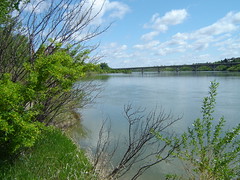
Canada 2007 004
Reading Kate’s blog made me think again about hyperlinking. Many writers, myself included, have commented on the ways in which hypertext allows for a radically new kind of literacy. But does it? Foucault conceives of text in terms of network and links. In The Archaeology of Knowledge, he points out that the "frontiers of a book are never clear-cut," because "it is caught up in a system of references to other books, other texts, other sentences: it is a node within a network . . . [a] network of references" (1989:23). Hyperlinks simultaneously provide deixis, alternative sources, rapid referencing and a kind of electronic footnoting. Hypertext offers readers multiple trajectories through the text and enables a choice in the depth of reading as well as access to other media. Although the reader has more control, more rapid access and is as a result given more authority, these choices are not in themselves new – they are differently presented, at our fingertips, embedded in the text.
3 comments:
yes; the newtork of references. Bakhtin would say that none of this is new I suspect. He would surely say we have always used the voices of others, interwoven within our own. Sometimes we are aware of it and sometimes not.
yes, I like that...and of course it re-surfaces in Barthes Image, Music, Text...I spose that's the way the past pre-figures the new tech, it just shrinks the intertextual space.
You should take partnership farther with Kate! Exertion of control over the others may serve you good!
Post a Comment